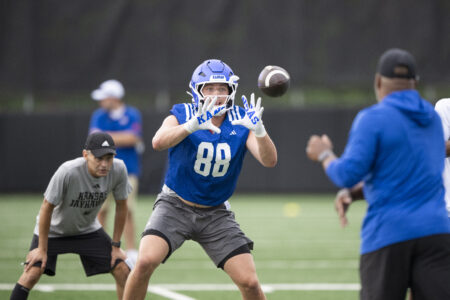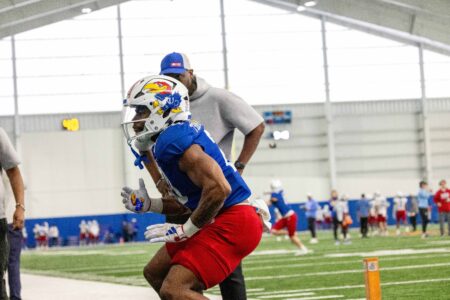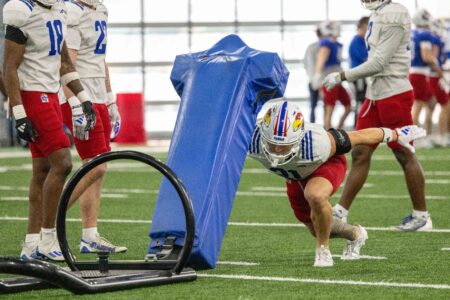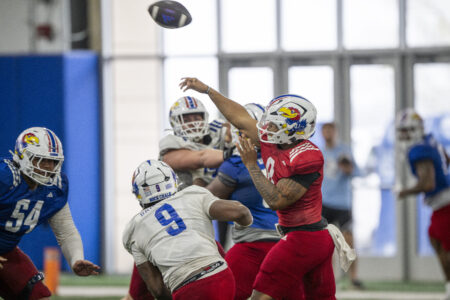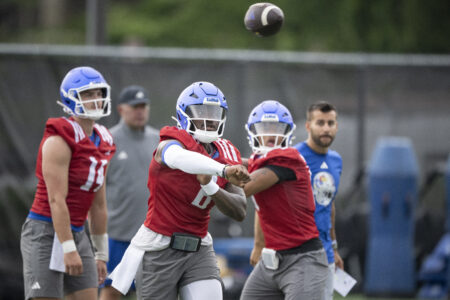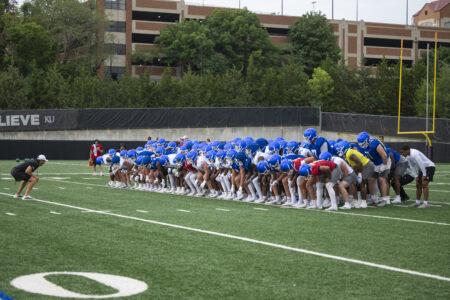Yormark lauds Big 12’s nationwide position amid CFP discussions

photo by: AP Photo/LM Otero
Big 12 Commissioner Brett Yormark speaks at the Big 12 NCAA college football media days in Frisco, Texas, Tuesday, July 8, 2025.
Updated 1:50 p.m. Tuesday, July 8, 2025:
Frisco, Texas — Big 12 Commissioner Brett Yormark, in his opening remarks at the conference’s media days at Ford Center at The Star on Tuesday morning, said he expects the league “to earn multiple College Football Playoff bids this year and to show once again that we can compete with anyone.”
The assertion characterized a set of comments by Yormark that centered most specifically on the Big 12’s position in the national competitive landscape, touching especially on the CFP, in which the league placed one program — Arizona State — as a No. 4 seed following the 2024 season.
Yormark reiterated his belief that the conference has the best top-to-bottom competitive balance of any league in the country. But he also acknowledged that it could be important for certain perennial contenders to begin to emerge in the new-look league, which beginning in 2023 added eight teams and lost two of its biggest brands in Oklahoma and Texas.
“I think parity matters — and I think ultimately over time, and it’s hopefully sooner than later, there’ll be a couple of our schools that’ll emerge as elite schools that are always part of the conversations at the highest levels,” Yormark said.
Those conversations will continue to evolve in the years ahead due to another significant factor Yormark delved into in depth, which is the ongoing transformation of the College Football Playoff format. He reiterated his support for the so-called 5+11 format for a future 16-team CFP, which would give one automatic qualifying spot to each of the five top conference champions and then supply 11 at-large berths.
“We continue to believe the 5+11 model proposed by the Big 12 and the ACC is the right playoff format for college football,” Yormark said. “We want to earn it on the field. We do not need a professional model, because we are not the NFL. We are college football, and we must act like it. There is nothing in sports like college football, and we must protect what makes it special and do what’s right for the fans and the game.”
The 5+11 model has come up against a 4-4-2-2-1+3 format, favored primarily by the Big Ten, which would give each power conference a greater number of automatic bids (four each for the Big Ten and SEC and two each for the Big 12 and ACC). The 5+11, however, also found an unlikely ally in late spring in the SEC’s coaches.
Yormark acknowledged that in the near term, two automatic bids could help the Big 12, but “long-term, knowing the progress we’re making, the investments we’re making, (5+11)’s the right format for us, and I’m doubling down today on 5+11.”
“And I know (ACC Commissioner) Jim Phillips will,” he added, “and I’m sure some of the other conference commissioners will as well.”
One minor move the Big 12 recently undertook to avoid inhibiting any of its schools’ future prospects was abolishing its preseason media poll, a past institution that Yormark said on Tuesday provided “no value.”
He further stated that last year’s poll, which ranked ASU last in the 16-team league, put the Sun Devils at a disadvantage as they climbed to the top of the conference, ultimately winning the Big 12 and earning their spot in the College Football Playoff. (ASU coach Kenny Dillingham, for his part, said of the poll’s potential impact last season, “”I could care less and I have no clue.”) Meanwhile, four of the top five schools as ranked in the poll, including Kansas, finished below .500 and missed the postseason.
The commissioner added that the transfer portal makes it harder to assess rosters before the year begins.
“I don’t know if it’s a trend or not,” Yormark said of abolishing the poll, “but certainly it’s the right thing for the Big 12 and I’m glad we did it.”
The move to eliminate the poll (though the all-conference team was preserved) brings the Big 12 in line with the Big Ten, among top leagues that don’t conduct a preseason poll for football.
The removal of the poll is in fact specific to football, as a league spokesperson noted following Yormark’s remarks, and doesn’t necessarily portend similar changes in other sports.


